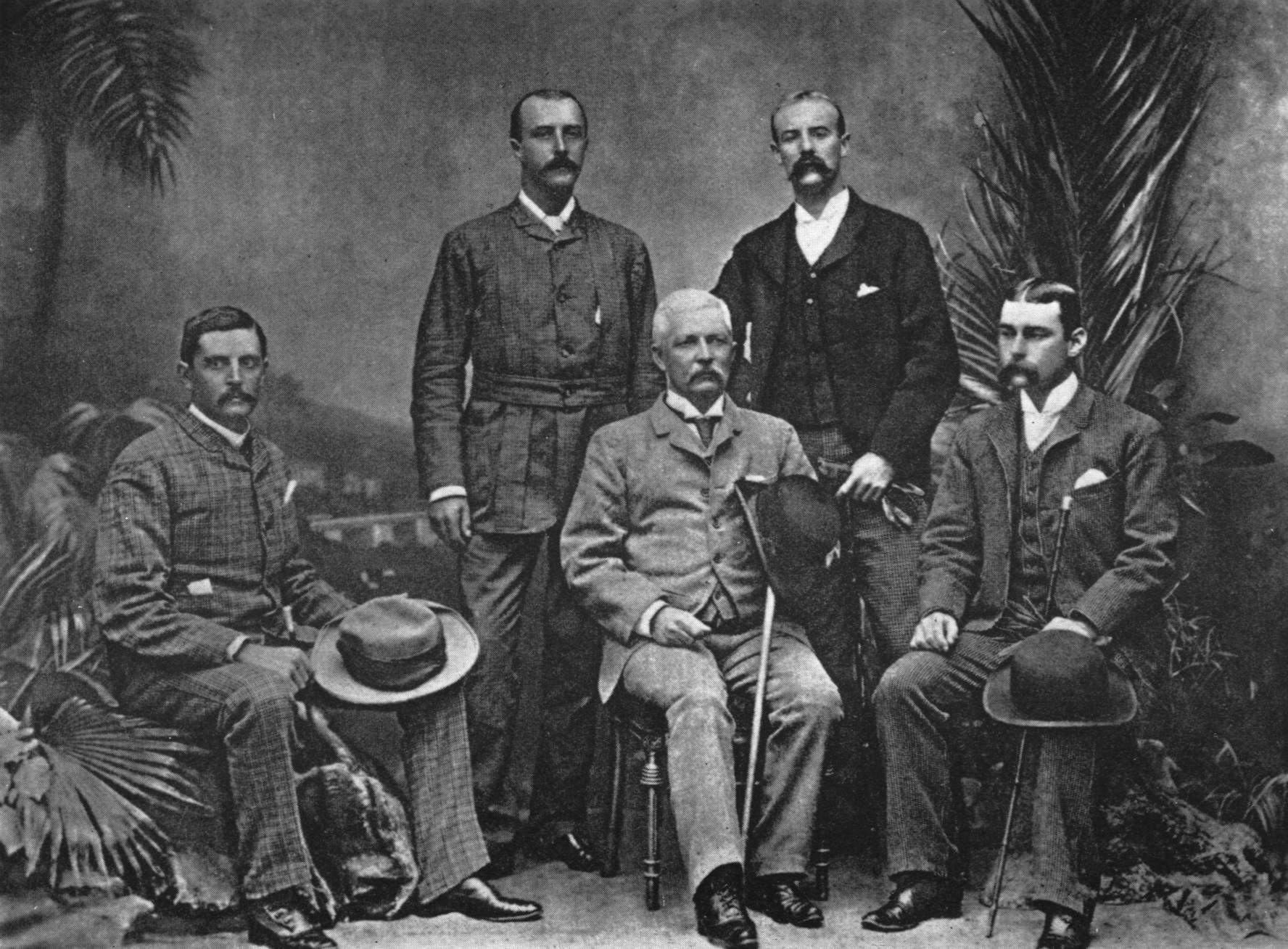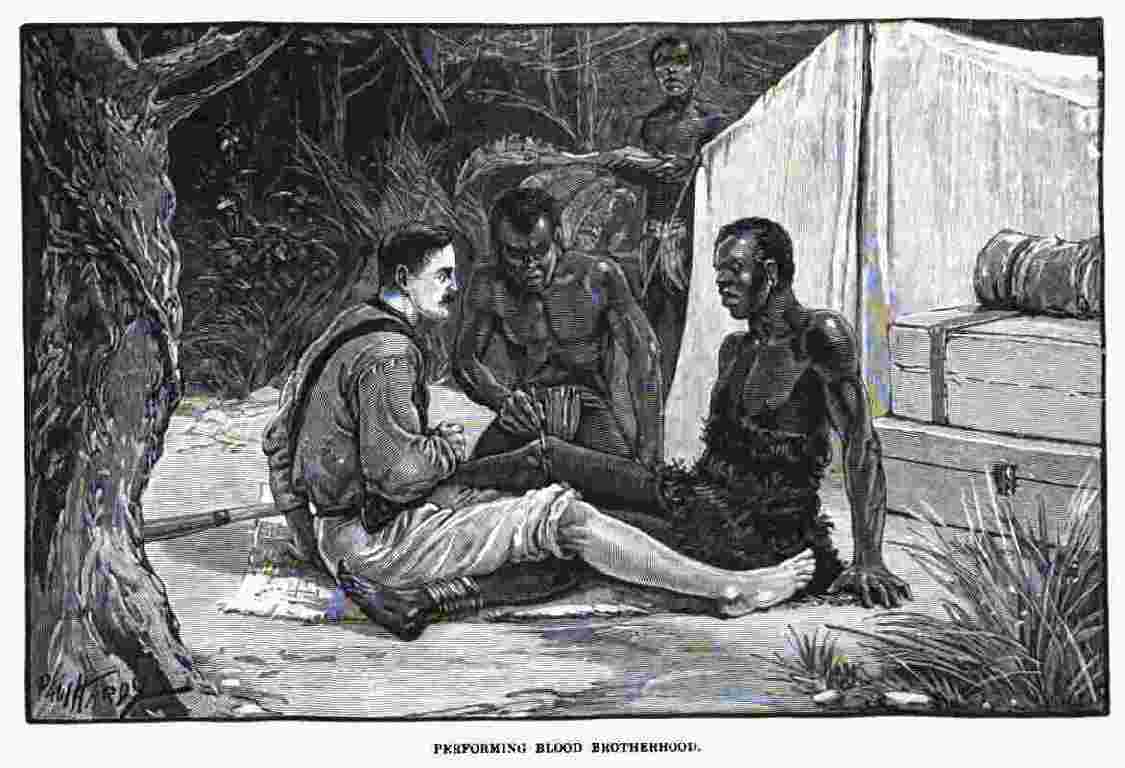Thomas Heazle Parke on:
[Wikipedia]
[Google]
[Amazon]
Thomas Heazle Parke (1857–1893) was an Irish physician, British Army officer and author who was known for his work as a doctor on the
 In January 1887, while in Alexandria, Parke was invited by
In January 1887, while in Alexandria, Parke was invited by 

 On the granite pedestal is a bronze plaque depicting the incident on 13 August 1887 when Parke sucked the poison from an arrow wound in the chest of Capt. William G. Stairs to save his life. He is also commemorated by a bust in the Royal College of Surgeons in Ireland.
On the granite pedestal is a bronze plaque depicting the incident on 13 August 1887 when Parke sucked the poison from an arrow wound in the chest of Capt. William G. Stairs to save his life. He is also commemorated by a bust in the Royal College of Surgeons in Ireland.
Some of his papers
are held at the Yale University Library
Emin Pasha Relief Expedition
The Emin Pasha Relief Expedition of 1886 to 1889 was one of the last major European expeditions into the interior of Africa in the nineteenth century, ostensibly to the relief of Emin Pasha, General Charles Gordon's besieged governor of Equato ...
.
Early life
Parke was born on 27 November 1857 at Clogher House in Kilmore,County Roscommon
"Steadfast Irish heart"
, image_map = Island of Ireland location map Roscommon.svg
, subdivision_type = Country
, subdivision_name = Ireland
, subdivision_type1 = Province
, subdivision_name1 = Connacht
, subdi ...
, Ireland. and was brought up in Carrick-on-Shannon, County Leitrim. He attended the Royal College of Surgeons in Ireland
The Royal College of Surgeons in Ireland (RCSI) is a medical professional and educational institution, which is also known as RCSI University of Medicine and Health Sciences, Ireland's first private university. It was established in 1784 ...
in Dublin, graduating in 1878. He became a registered medical practitioner in February 1879, working as a dispensary medical officer in Ballybay, and then as a surgeon in Bath, Somerset
Bath () is a city in the Bath and North East Somerset unitary area in the county of Somerset, England, known for and named after its Roman-built baths. At the 2021 Census, the population was 101,557. Bath is in the valley of the River Avon, ...
.
Military career
Parke joined the British Army Medical Services in February 1881 as a surgeon, first serving in Egypt during the final stages of theʻUrabi revolt
The ʻUrabi revolt, also known as the ʻUrabi Revolution ( ar, الثورة العرابية), was a nationalist uprising in Egypt from 1879 to 1882. It was led by and named for Colonel Ahmed ʻUrabi (also spelled Orabi and Arabi) and sought to d ...
in 1882. As a senior medical officer at a field hospital near Cairo, Parke was responsible for treating battle casualties as well as the deadly cholera epidemic
Seven cholera pandemics have occurred in the past 200 years, with the first pandemic originating in India in 1817. The seventh cholera pandemic is officially a current pandemic and has been ongoing since 1961, according to a World Health Organizat ...
that afflicted 20% of British troops stationed there. In late 1883, Parke returned to Ireland, where he was stationed at Dundalk with the 16th The Queen's Lancers
The 16th The Queen's Lancers was a cavalry regiment of the British Army, first raised in 1759. It saw service for two centuries, before being amalgamated with the 5th Royal Irish Lancers to form the 16th/5th Lancers in 1922.
History
Early war ...
. He arrived in Egypt once again in 1884 as a part of the Nile Expedition
The Nile Expedition, sometimes called the Gordon Relief Expedition (1884–85), was a British mission to relieve Major-General Charles George Gordon at Khartoum, Sudan. Gordon had been sent to the Sudan to help Egyptians evacuate from Sudan af ...
sent in relief of General Charles Gordon, who was besieged in Khartoum by Mahdists
The Mahdist War ( ar, الثورة المهدية, ath-Thawra al-Mahdiyya; 1881–1899) was a war between the Mahdist Sudanese of the religious leader Muhammad Ahmad bin Abd Allah, who had proclaimed himself the "Mahdi" of Islam (the "Guided On ...
in neighbouring Sudan. The expedition arrived too late and Gordon was killed; Parke would later negatively recount this experience in an 1892 journal article titled ''How General Gordon Was Really Lost.'' Following the expedition, Parke spent the next few years stationed in Alexandria, where he notably introduced fox hunting to Egypt, becoming master of the Alexandria Hunt Club.
Emin Pasha Relief Expedition
 In January 1887, while in Alexandria, Parke was invited by
In January 1887, while in Alexandria, Parke was invited by Edmund Musgrave Barttelot
Edmund Musgrave Barttelot (28 March 1859 – 19 July 1888) was a British army officer, who became notorious after his allegedly brutal and deranged behaviour during his disastrous command of the rear column in the Congo during Henry Morton St ...
to accompany him on the Emin Pasha Relief Expedition
The Emin Pasha Relief Expedition of 1886 to 1889 was one of the last major European expeditions into the interior of Africa in the nineteenth century, ostensibly to the relief of Emin Pasha, General Charles Gordon's besieged governor of Equato ...
. The expedition would be led by Henry Morton Stanley
Sir Henry Morton Stanley (born John Rowlands; 28 January 1841 – 10 May 1904) was a Welsh-American explorer, journalist, soldier, colonial administrator, author and politician who was famous for his exploration of Central Africa
Cen ...
, and would journey through the African wilderness in relief of Emin Pasha
185px, Schnitzer in 1875
Mehmed Emin Pasha (born Isaak Eduard Schnitzer, baptized Eduard Carl Oscar Theodor Schnitzer; March 28, 1840 – October 23, 1892) was an Ottoman physician of German Jewish origin, naturalist, and governor of the Egyp ...
, an Egyptian administrator who had been cut off by Mahdist forces following the Siege of Khartoum. Parke was initially rejected by Stanley upon his arrival in Alexandria, but was invited by telegram a day later to join the expedition in Cairo. On 25 February 1887, the expedition set off from Zanzibar in the east for the Congo in the east.
The expedition lasted for three years and faced great difficulty, with the expedition of 812 men suffering from poor logistical planning and leadership. The rainforest was much larger than Stanley expected, leading much of the party to face starvation and disease. The expedition had to resort to looting native villages for food, escalating the conflict between the two groups. Parke, for his part, saved the lives of many in the party, including Stanley, who suffered from acute abdominal pain and a bout of sepsis. Stanley described Parke's care as "ever striving, patient, cheerful and gentle…most assiduous in his application to my needs, and gentle as a woman in his ministrations". Parke also treated Arthur Jephson
Arthur Jermy Mounteney Jephson (1859–1908) was an English merchant seaman and army officer. He became an adventurer and African explorer, who accompanied H. M. Stanley on the Emin Pasha Relief Expedition, 1887–1889.
Emin Pasha Relief Expedi ...
for fever, and nursed Robert H. Nelson through starvation. Furthermore, after a conflict with the natives, Parke had to save William Grant Stairs
William Grant Stairs (1 July 1863 – 9 June 1892) was a Canadian-British explorer, soldier, and adventurer who had a leading role in two of the most controversial expeditions in the Scramble for Africa.
Education
Born in Halifax, Nova Scotia, ...
by orally sucking the poison out of an arrow wound.
During the expedition, Parke purchased from an Arab slaver a Mangbetu Pigmy girl, who would serve his nurse and servant for over a year.


Later life
After returning to Ireland, Parke received an Honorary Fellowship of theRoyal College of Surgeons in Ireland
The Royal College of Surgeons in Ireland (RCSI) is a medical professional and educational institution, which is also known as RCSI University of Medicine and Health Sciences, Ireland's first private university. It was established in 1784 ...
and was awarded gold medals from the British Medical Association
The British Medical Association (BMA) is a registered trade union for doctors in the United Kingdom. The association does not regulate or certify doctors, a responsibility which lies with the General Medical Council. The association's headquar ...
and the Royal Geographical Society
The Royal Geographical Society (with the Institute of British Geographers), often shortened to RGS, is a learned society and professional body for geography based in the United Kingdom. Founded in 1830 for the advancement of geographical scien ...
. He published several books, including ''My Personal Experiences in Equatorial Africa'' (published in 1891) and ''A Guide to Health in Africa''.
In August 1893, Parke visited William Beauclerk, 10th Duke of St Albans in Ardrishaig
Ardrishaig ( gd, Àird Driseig) is a coastal village on Loch Gilp, at the southern (eastern) entrance to the Crinan Canal in Argyll and Bute in the west of Scotland. It lies immediately to the south of Lochgilphead, with the nearest larger to ...
, Scotland. He died during that visit on 11 August 1893, presumably due to a seizure. His coffin was brought back to Ireland, where he received a military funeral as it passed from the Dublin docks to Broadstone railway station
Broadstone railway station ( ga, Stáisiún An Clocháin Leathan) was the Dublin terminus of the Midland Great Western Railway (MGWR), located in the Dublin suburb of Broadstone. The site also contained the MGWR railway works and a steam ...
. Parke was buried near his birthplace in Drumsna
Drumsna ( which translates as ''the ridge of the swimming place'') is a village in County Leitrim, Ireland. It is situated 6 km east of Carrick-on-Shannon on the River Shannon and is located off the N4 National primary route which li ...
, County Roscommon.
Honours
A bronze statue of Parke stands on Merrion Street in Dublin, outside the Natural History Museum. On the granite pedestal is a bronze plaque depicting the incident on 13 August 1887 when Parke sucked the poison from an arrow wound in the chest of Capt. William G. Stairs to save his life. He is also commemorated by a bust in the Royal College of Surgeons in Ireland.
On the granite pedestal is a bronze plaque depicting the incident on 13 August 1887 when Parke sucked the poison from an arrow wound in the chest of Capt. William G. Stairs to save his life. He is also commemorated by a bust in the Royal College of Surgeons in Ireland.
References
* * * Lyons, J. B. ''Surgeon Major Parke's African journey 1887-89.'' The Lilliput Press, Dublin. 1994.Some of his papers
are held at the Yale University Library
External links
* * Thomas Heazle Parke Papers (MS 1643). Manuscripts and Archives, Yale University Library. {{DEFAULTSORT:Parke, Thomas Heazle 1857 births 1893 deaths 19th-century Irish people Irish naturalists Irish scientists British Army personnel of the Mahdist War People from County Leitrim Royal Army Medical Corps officers Irish officers in the British Army Irish explorers Fellows of the Royal Scottish Geographical Society